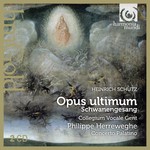
Schutz: Opus Ultimum, Schwanengesang
 $30.00
Out of Stock
$30.00
Out of Stock6+ weeks add to cart more by this artist
HEINRICH SCHUTZ
Schutz: Opus Ultimum, Schwanengesang
Collegium Vocale Gent, Concerto Palatino, Philippe Herreweghe (Direction)
[ Harmonia Mundi / 2 CD ]
Release Date: Wednesday 30 August 2017
This item is currently out of stock. It may take 6 or more weeks to obtain from when you place your order as this is a specialist product.
In the early 1660s, Schütz, now relegated among the faded glories of the Dresden court, began to prepare for the idea of his own death - he was now more than 65 years old . . . He embarked on a setting of all 176 verses of Psalm 119, without necessarily expecting the resulting work to be performed: his swansong was conceived for all eternity. Ten years later, this Opus ultimum had assumed the form of 11 motets for double choir. Since the manuscripts were dispersed after his death, it was to be another three centuries before the work was reconstructed - and then sung!
"Can this be the greatest work by an octogenarian before Strauss. A "blooming cradle of sound" is how Jonathan Freeman-Attwood describes the Ghent Collegium Vocale's performance here, and an apt description it is too. The ear rests gratefully on that cradle, carried through Schütz's magnificent Opus ultimum in a truly glorious manner. Herreweghe draws marvellous sounds from his forces, with the musical line and detail never sacrificed."
(Editor's Choice Gramophone June 2007)
"Opus Ultimum is the title given to Heinrich Schütz's last collection of sacred music, written shortly before his death, aged 87, in 1672. It consists of an immense setting, nearly two hours long, of Psalm 119, followed by the shorter Psalm 100 and the Magnificat. The music was composed without any thought of performance and forms both a self-conscious farewell to the world on Schütz's part, and an attempt to encapsulate the totality of his musical understanding in a single, all-encompassing work. It remained unheard until the 1970s, when the score, long believed lost, was discovered in a library in Dresden where Schütz spent most of his working life.
It's far from morbid or austere. Though deeply Protestant, Schütz trained in Italy, and Philippe Herreweghe and his Collegium Vocale bring just the right amount of sensuousness to bear on its devotional atmosphere. You take away from the performance the overwhelming impression of an old man preparing to meet his God in a mood of philosophical calm, yet still filled with a sense of wonder at creation, God's as well as his own. Wonderfully done, and very moving." GUARDIAN.CO.UK